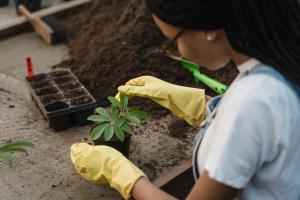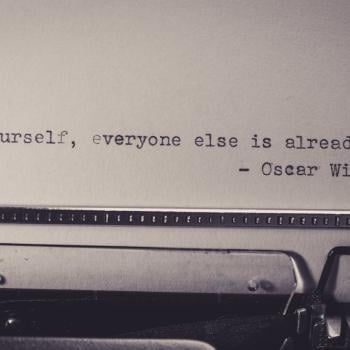
As I progress in my deconstruction and the subsequent journey, it seems that language becomes especially important and, sometimes, the old vernacular doesn’t work for me anymore. I am constantly searching for new language to attach to my journey in an attempt to have a more authentic experience. For example, I now call my journey an evolution instead of a reconstruction since I don’t just want to rebuild something similar to the past—I want to evolve to something entirely new.
Two of the words that seem extremely relevant these days are compost and communion. The terms keep reemerging and surfacing in my podcasts at The Desert Sanctuary and in conversations with people.
I want to explain this as clearly and precisely as I can, so bear with me. These two terms mean so much to me right now and it may be difficult.
Compost
Behind my house, near the garden, is my compost barrel. In the mud room of my house is a container with a lid where I capture all the plant scraps from our meals. This container holds vegetable scraps, coffee grounds, and other assorted plant-based remnants. When it is full, I take it out the barrel and mix it with some leaves and yard waste. Add a little water, a little mixing and over time, and it becomes black gold for my garden.
To me, compost is a beautiful metaphor for death and new life. Composting happens naturally in nature but requires a little effort in our manicured gardens. I tried just tossing the scraps directly on the garden, but it gets a little messy that way and it attracts the local critters.
So how does compost relate to my evolution?
The first area it impacts is my feelings about Scripture. Understand, like Pete Enns, I’m not saying that Scripture is garbage. Like I said, compost is pure gold and especially important. Like Paul said, “It is useful,” but maybe we have made it something it was never intended to be. Enns quotes Walter Bruggeman in his article, The Bible: Cookbook or Compost Pile?
The Bible is the compost pile that provides material for new life. I do not use this figure as an irreverent metaphor to suggest that the Bible is “garbage.” Rather, I use it to suggest that the Bible itself is not the actual place of new growth. Our present life, when we undertake new growth, is often inadequate, arid, or even barren. It needs to be enriched, and for that enrichment, we go back to the deposits of old growth that have been discarded, but that continue to ferment and may contain resources for a way to new life. (Texts Under Negotiation, pp. 61-62)
When we can see the Bible correctly, it becomes enrichment for our new life and creates fresh, vibrant soil for the journey ahead.
But I also find myself applying the compost metaphor to religion. In my estimation and in its simplest form, religion is an exercise to understand the Divine. When we assume we now understand parts of this mystery, we usually surround that new belief with practices and rituals that help us teach it to the future generations. But the example of Jesus was to take some of those old practices like temple worship and sacrifice and toss them on the compost pile. It is not that they weren’t important or useful, they just were not the final answer. Similar to Scripture, they were important to new life, but they were not the life itself.
Communion
As I may have already mentioned, many of the words of the past ring hollow for me. Sometimes that scares me—sometimes it triggers me—other times I sense I’m on a worthwhile quest. I often inadvertently cause an argument on social media because I challenge these ancient, familiar words.
One of those words is worship.
Jesus was obviously somewhat religious, at least by tradition. But he blew up a lot of his religious upbringing when he challenged temple worship, sacrifices, and even the Hebrew Scriptures themselves. Because religion was prevalent, he entered that world and became somewhat subversive to it.
I feel the same way especially about modern worship. I literally, am unsure about whether God even desires worship. I question whether the Divine would need for someone to worship them and still be absolutely holy. Why would the creator need to be reassured of their greatness? It seems like worship is a collected idea from our religious past. Jesus said the new way would be “spirit and truth” and we have yet to discover what this actually means.
For me, a lot of things make more sense when we use the word communion.
Worship – instead of going somewhere to do something, I commune with “God.” It is much simpler and seems more authentic to me.
Prayer – instead of asking for things or feeling obligated to recite to God, I simply connect / commune. This practice of stillness is so much more rewarding and beneficial to me.
Evangelism / Discipleship – instead of converting people, I live / commune with them. This is enough and probably accomplishes more in the long run.
I experience this most in stillness.
And the benefit to these two words, compost and communion, is that they “enhance” each other. My communion with the Divine and others is enriched by the compost of Scripture and religion because the dying of old ideas brings new life to the present. This new life and communion become the nutrients for future life and evolution.
It really is a circle of life, I guess. But it is a circle of life that spirals upward. I wish you well on your journey!
Be where you are, Be who you are,
Karl Forehand













